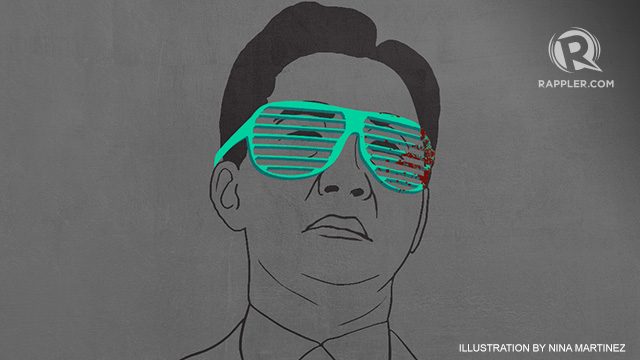SUMMARY
This is AI generated summarization, which may have errors. For context, always refer to the full article.

Since the fall of the dictator, anti-authoritarian fears have always revolved around the threat of a new Marcos. In the late 1990s, when then-President Fidel Ramos attempted to amend the Constitution to allow him to seek a second term ostensibly, anti-Marcos forces led by former President Cory Aquino blocked him, declaring they would “never again” allow the law to be manipulated. In the early 2000s, when President Joseph Estrada was surrounding himself with a coterie of cronies, commentators once again warned about the “ghost of Marcos.” Finally, Gloria Arroyo, who placed the Philippines under a “state of rebellion” to dampen protests against her and who aimed to build a centralized “strong republic,” was similarly tainted with a Marcosian brush.
Rodrigo Duterte has reversed all these, making the notion of a strong leader in vogue again, beginning with a revisionist interpretation of Ferdinand Marcos. Duterte boasts how much he owed his election success to the Marcos family and he would reciprocate by getting the cadaver of the dictator moved from Paoay to the Libingan ng mga Bayani.
The returns to this friendship had been a boon to the Marcoses. Bongbong’s influence over national politics has never been more pronounced, with him having the President’s ear and a throng of pro-dictatorship “trolls” at his disposal to spread historically revisionist material about the “golden era” of martial law.

But the relationship is more than just patronage-driven. Duterte has a deep admiration for Marcos’ strong-arm tactics and the late dictator’s capacity to justify these on legal-constitutional grounds. He used deadly force (the Davao Death Squad, DDS) to achieve results, but he would also repeatedly remind us that he did this as someone familiar with the law (him being a prosecutor). He was strongman and disciplinarian yet also a constitutionalist – the 21st-century version of his pin-up Ferdinand Marcos. No post-authoritarian president has publicly mused about the declaration of martial law as much as Duterte.
His actions since assuming office appeared taken from Marcos’ playbook. He gave the Philippine National Police (PNP) carte blanche to go after and kill drug lords, pushers, and addicts. He vowed to kill a million users if need be, in the same way Adolf Hitler killed millions of Jews. Duterte promised the police that he would protect them even from legal action, and police doubled up in their campaign with the poor as their prime targets.
The majority of those killed “were not drug lords, but either small-time dealers selling shabu (as methamphetamine is known locally) to raise themselves out of poverty, or light drug users who would occasionally scrape together enough money to buy a sachet of shabu to escape the misery of Manila’s shanty towns.” Police and paid assassins have raided urban poor communities, executing “defiant” addicts or pushers, but when it came to attacking the Golden Ghettos of Manila and middle class “subdivisions,” the police has deferred to leaders of these plush residential areas. No drugs had been “discovered,” no suspected addicts arrested or killed.
Duterte admitted a partiality toward the wealthy, but insisted, “given that the poor outnumber the rich, the campaign could not afford to spare the underprivileged from arrests.” He blamed the rich for using their immense resources to thwart the police but also excused the rich, saying their addicts only consume “safe drugs” (cocaine, marijuana, heroine) and not shabu.
The criticism of the extrajudicial killings, however, has hardly made a dent on the public mind. How then to explain this collective slide into ruthlessness? First, we have to understand the fact that these crimes are mainly community-level felonies. The overall statistics may suggest that the percentage of addicts to the general population is small.
However, viewed from below, their presence on the streets of villages, towns, communities, and even cities show that the number of addicts appears to be increasing. Together with their drug pushers, they have maintained and expanded their networks and bring in new users. Communities feel helpless in preventing the spread of addiction for two reasons. The market for drugs is often the young in the village, the children that many a parent try to prevent from turning into addicts. This is a stable market for the networks because childlike curiosity and the pressures of poverty make the neighborhood teenagers easy to lure.
Second, even if people band together to force drug pushers and users out of their communities, their actions will be severely constrained by policemen and politicians in the drug lords’ pockets, if not the drug lords themselves. Neither is the court system sympathetic. Trials are lengthy, and the moneyed drug lord could outspend complainants. Witnesses can be bribed, and, when necessary, threatened with death, while judges and prosecutors can be paid enough to slow down the proceedings. And we are not even talking about the appeals process yet. Duterte’s “if-you-deal-in-drugs-I-will-kill-you” approach cuts through this mishmash. It is simple, goes immediately for the jugular, eliminates the community threat with some finality, and considerably weakens the corrupted power of politicians and police.
For residents of these blighted communities, already exposed for an extended duration to different types of violence, the assassination of addicts and pushers can easily be justified as either a part of everyday life or a further confirmation of the adage “what-goes-around-comes-around.” 83% of Filipinos believe that Duterte is up to the challenge. Hence, the considerable leeway granted these executions.
How much power will Duterte arrogate unto the presidency? How far will he be able to use the national version of the DDS to further his goals? Will he use these assassination teams to silence dissent nationwide? And will Duterte be able to fortify his praetorian guard with members of the military (a necessary measure for a young dictator given how inferior the police are to the military)? Duterte’s Marcosian project is work-in-progress, and it has not been articulated in as harsh a way as the dictator’s New Society. After a year of him in office, we see statist centralization moving forward, and strengthening unparalleled in the post-EDSA presidency.
Congress has approved an increased allocation to the Office of President, from P2.87 billion ($61.44 million) in 2016 to P20.03 billion ($430.3 million) for 2017 – an increase of more than P17 billion, or about $370 million. Then when the Maute gang seized Marawi, he declared martial law. He now awaits other terrorist attacks to make that declaration cover the entire country. – Rappler.com
Patricio N. Abinales is an OFW. He is a professor of Asian Studies at the University of Hawaii-Manoa. He wrote the book Making Mindanao: Cotabato and Davao in the Formation of the Philippine Nation-State (Ateneo, 2000).
Add a comment
How does this make you feel?
There are no comments yet. Add your comment to start the conversation.